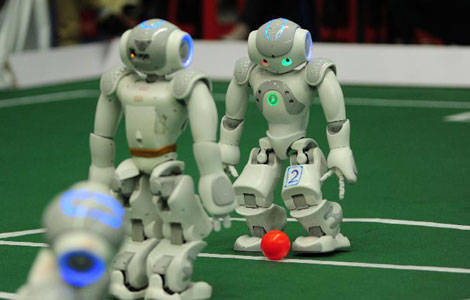GM rice taste test quells doubts
Updated: 2013-10-22 10:10
(English.news.cn)
|
|||||||||||
About 260 Chinese volunteers participated in a taste test of genetically modified (GM) rice, hoping to reassure the public about the food.
The volunteers savored cakes and porridge made from GM rice at a campaign initiated by pro-GM Internet users on Saturday at Huazhong Agriculture University in Wuhan, capital city of central China's Hubei Province. The rice included "golden rice", grown by the university and modified to be rich in beta carotene.
GM food remains controversial nearly two decades after being introduced to the commercial market, as there is still no consensus on whether or not it is harmful to humans.
"Today, genetically engineered food is everywhere. My wife buys modified soy oil all the time, even after she became pregnant months ago," said Zhu, a participant who works in IT at a bank in Wuhan.
The volunteers, from 20 provinces and municipalities, signed up for the event via QQ, a popular instant messaging tool.
"Maybe we are all skeptics at the beginning. But some day we must believe the things we used to distrust," said another volunteer from Shanghai. "We should not blindly object to high and new technology, like genetic modification."
Similar taste tests have been staged since May in more than 20 cities, drawing over 1,000 participants.
"The taste test is the best way to popularize GM food," said Yan Jianbing, a pro-GM professor with the School of Life Sciences at Huazhong Agriculture University. Such events dispel doubts abound GM food and raise its acceptance by the public, he added.
"A plight facing us is that our country has resisted commercializing GM food and we're missing out on a huge opportunity," Zhang Qifa of the Chinese Academy of Sciences and Dean of School of Life Sciences at the Wuhan university, told volunteers in T-shirts reading: "Love Science, Support Genetic Modification".
GM crops are more resistant to disease and pests, and need less pesticide and chemical fertilizer, said Zhang.
The campaign has apparently failed to convince critics concerned about health risks and environmental impact. "What we don't know is far more than we do know. Scientists also have very limited knowledge," said Chen Xirui, a 36-year-old teacher in Wuhan.
GM rice was at the center of a storm when it emerged that 25 children in central China's Hunan province were fed U.S.-grown "golden rice", as part of a research program led by a professor from Tufts University in 2008. A probe by the Chinese Center for Disease Control and Prevention (China CDC) showed Tang Guangwen of Tufts, along with researchers from the China CDC and Zhejiang Academy of Medical Sciences, conducted the test without telling parents that GM food was used. Several CDC officials and researchers were punished for certifying the test and concealing information.
Tang was banned from conducting human body research for two years, and families of the children each received 80,000 yuan (13,000 U.S. dollars) in compensation from local authorities.
In November 2009, the Ministry of Agriculture granted biosafety certificates for two pest-resistant GM rice varieties and one variety of corn, making China the first country in the world to give the nod to field trials of GM staple foods.
Related Stories
Chinese hybrid rice yield hits record 2013-09-30 09:23
Paddy rice fields in China's Anhui 2013-09-13 11:18
Hani rice terraces in UNESCO heritage 2013-06-23 07:49
Rice dumplings 2013-06-09 09:44
Today's Top News
UK official looks to China for support
Economy to see 'good ending' in Q4
Teacher killed in US school shooting
Border agreement to boost ties
US OKs Alibaba structure
Beijing works to spur global development
Scientists requested government to plant GM crops
Travelers to Europe bypass attractions of Brussels
Hot Topics
Lunar probe , China growth forecasts, Emission rules get tougher, China seen through 'colored lens', International board,
Editor's Picks

|

|

|

|

|

|





